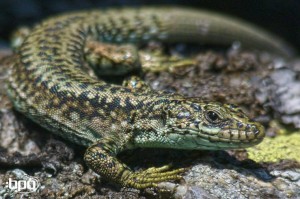With all of the crazy weather occurring around the world (unbelievable—literally—snowstorms in Atlanta?), climate change is receiving increasingly more attention from the public and scientists alike. There has been extensive research on evolutionary responses to climate change and how warming temperatures might affect species ranges.
But so far there has been very little research examining the effects of climate change on the sexual signals of animals. And while the mating behaviors of humans are probably safe from global warming, the threatened Carpetan rock lizard (Iberolacerta cyreni) living in the mountains of Central Spain may not be so lucky.
(The incredibly romantic mating strategy of rock lizards) http://www.youtube.com/watch?v=1l2zlbFKi9o
A recent study conducted by researchers from the National Museum of National History in Spain tested the hypothesis that increasing environmental temperatures would lower the efficiency of the lizards’ sexual signals. These signals are incorporated into the male’s chemical secretions, which are used to mark their territories and attract females. Previous studies have shown that females spend more time in territories marked by secretions containing higher levels of provitamin D (a compound that can be converted into vitamin D), therefore increasing the mating opportunities of the male controlling that area.
The study found that higher temperatures caused these secretions to degrade more rapidly, lowering the ability of females to detect them. Females also spent less time in areas that were experimentally maintained at higher temperatures compared to areas maintained under current environmental temperatures. Degraded signals may also provide less information to females about male body size, health, and other important factors that go into mate choice.
The inability to detect sexual signals could ultimately disrupt sexual selection in rock lizards. If signals become less informative, females might begin choosing mates at random rather than choosing the healthiest and strongest males, which could affect the evolution of the species in the future.
Although species have always had to adapt to changes in climate, human-induced climate change is occurring so rapidly that many species, including the Carpetan rock lizard, may not be able to keep up. Additional research needs to be done on how global warming will affect the biology of the species in order for conservation efforts to be as effective as possible.
Reference: Martín, J., López, P. 2013. Effects of global warming on sensory ecology of rock lizards: increased temperatures alter the efficacy of sexual chemical signals. Functional Ecology, 27: 1332–1340.

